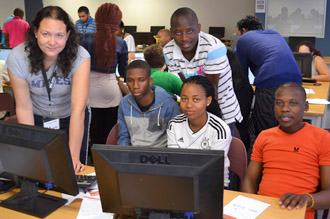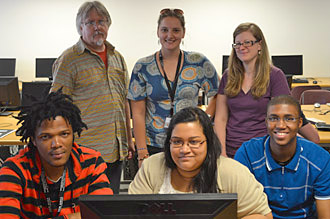|
SKA astronomy workshop in KwaZulu-Natal trains bright young minds Leading astronomers from several international institutions recently converged upon Durban to train a group of bright young astronomy students at an introductory radio astronomy school hosted by the University of KwaZulu-Natal (UKZN).
The Square Kilometre Array (SKA) funded workshop was held with the aim of preparing 40 South African undergraduate students in the methods required to work with data from the Karoo Array Telescope (MeerKAT) and the future SKA telescope. The SKA telescope will be built in South Africa and Australia by 2025 and will be the largest and most powerful telescope in the world. The SKA School, which took place from 30 November until 5 December 2013 at the UKZN Westville campus, provided a dynamic environment for the students to work with leading international astronomers from Canada, France, India and the USA. Apart from attending lectures and tutorials, students also worked on group projects, gave presentations, had a fun night out at uShaka Marine World and visited the Radio Astronomy Telescope (RAT) group at the Durban University of Technology (DUT). Melting pot of bright young minds "The School was a melting pot of bright young minds, from diverse backgrounds, engaging with a top team of international lecturers and local researchers," said Dr Caroline Zunckel, a lecturer at UKZN and chair of the School organising committee. "Spicy, like Durban curry," she added. The students who attended, currently study science or mathematics at various universities throughout South Africa, but share a common interest in pursuing a career in astronomy. "Attending the school was very enjoyable and I found it easy to absorb the information," said Potso Molebatsi from the University of Cape Town. Monique Willemse, a student from the University of Pretoria also enjoyed attending the School and felt that "it was exciting to be taught by leading international astronomers". Professor Keith Vanderlinde from the Dunlap Institute for Astronomy and Astrophysics at the University of Toronto, who taught Synthesis Imaging at the School, commented that "it was fantastic to get world experts together to train future astronomers". "The students displayed a willingness to learn," said Professor Martin Bucher, a Director of Research at the National Center for Scientific Research in France, who lectured on Interferometry. "I would be happy to lecture at the next instalment of this school," he added. The SKA School was funded by SKA South Africa and jointly hosted by the University's Astrophysics and Cosmology Research Unit (ACRU) and the Radio Astronomy Telescope (RAT) group at DUT. Building our knowledge economy "We were really happy to support this training school and collaborative workshop," said Dr Bernie Fanaroff, director of the South African SKA project. "These activities are key to training the next generation of South African scientists and building our knowledge economy." The local economy is poised to benefit from the construction and operation of the SKA telescope through the employment of a large number of South African graduates in various fields, including astronomy, information technology and engineering. Astronomers in the KwaZulu-Natal region have recognised the importance of initiatives such as the SKA School in order to meet the future demand for astronomy graduates, and to start building the knowledge base of the country. Due to the success of the SKA School, it is hoped that more initiatives of a similar nature will be held. By Strini Rajgopaul, Public Relations and Outreach Officer, Astrophysics and Cosmology Research Unit, UKZN |

